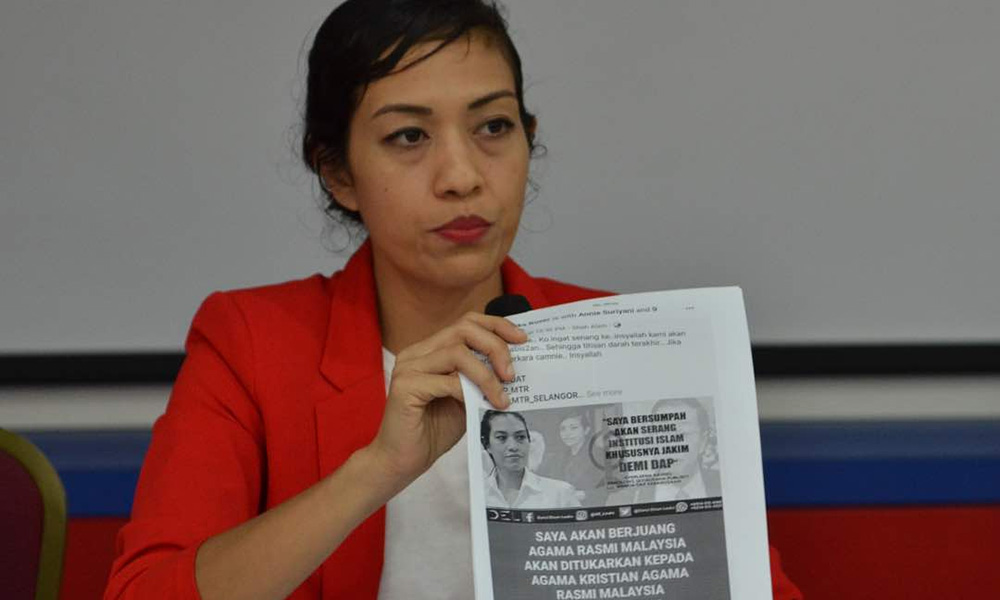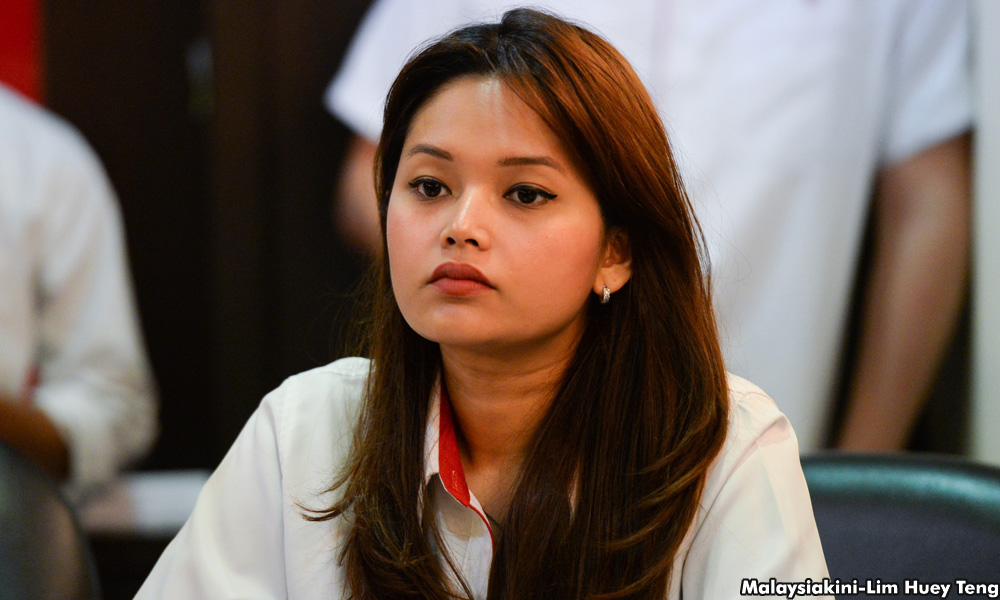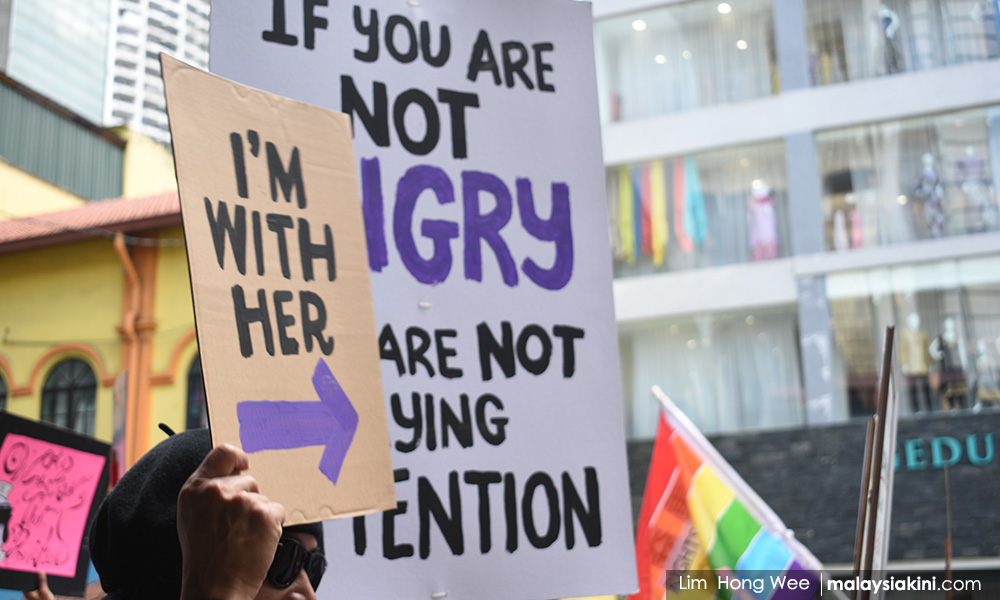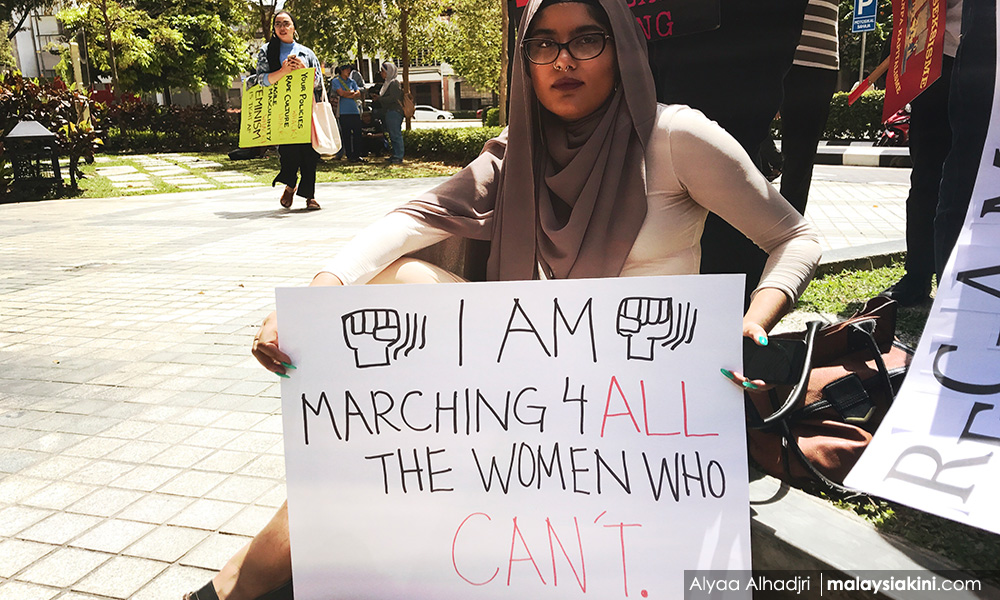
"What needs to be addressed is how government-sanctioned platforms that could have been used to preach tolerance, love and respect are instead being used to spread evil gospels that preach hatred and overzealous bigotry.”
– Syerleena Abdul Rashid
– Syerleena Abdul Rashid
The online abuse against DAP’s Syerleena Abdul Rashid is typical of the mob mentality of those who attack someone like Maryam Lee or anyone else that goes against the groupthink that certain quarters feel the need of defending.
When Gerakan’s Raja Sara Petra got into a skirmish with DAP’s Dyana Sofya Mohd Daud of DAP a couple of years back, the online abuse she faced was horrific, considering the issue in contention was claims made by Dyana of how Umno had “cheated the Malays.”
While the mob mentality of the opposition revolves around specific narratives, that of establishment partisans usually centres on the role of race and religion and how opposition operatives, either political or social, are eschewing their traditional roles.
If you read some of the comments whenever someone like Umno's Azalina Othman Said, for instance, says anything, and contrast this with the comments received by opposition operatives like Syerleena, both display a level of misogyny that ironically opposition supporters do not see or seem to understand.
Women who participate in politics from both sides of the political divide tell me that the level of abuse they receive online is far worse than the men, who more or less say the same thing. We are talking about a specific type of hate here.
When opposition women receive abuse from certain quarters of the online community, there are outpourings of sympathy, but when it comes to pro-establishment women, they are reminded that not to expect any sympathy when they put themselves in the position of being "criticised.”
Rational discourse impossible
And if you are a Muslim woman, it is very much worse. Last year the BBC ran an article titled “The online abuse hurled at Malaysia's Muslim women,” which included quotes from not only Dyana (photo), but also Maryam.

It begins with this, and just gets more depressing: "‘We are seeing a trend where Muslim women (particularly Malay-Muslims) are targeted in a different way, especially when it comes to how they present themselves,’ says Juana Jaafar, a women's rights advocate who followed the case of the 15-year-old girl. Juana says the attacks became so brutal for the girl, she was forced to delete her account and seek help offline.”
The problem with all this online abuse, either from establishment or opposition partisans, is that it makes rational discourse impossible. Especially when it comes to reforming a religion or challenging the status quo, women, more often than not – especially those who are Muslim – are at the forefront.
Either conservative or liberal, Muslim women are targets for what they say by anonymous cretins, who have no problem spewing racial or religious filth and smugly thinking that are on the "right" side.
When someone like Syerleena criticises the religious institutions which have a profound impact on the lives of Muslims in this country, it is a broader criticism on religious institutions who are do not have the ability to sanction adherents, but which operate on a different level.
For example, I know of many women who self-identify as Hindu or Christian who have been on the receiving end of online and real-life abuse from their communities, because their activism challenges the status quo when it comes to the respective religion and cultures.
As more women participate in the political and religious process of this country, the more opportunities for online and real life abuse they face. Many political operatives in the opposition, for instance, have found themselves on the receiving end of state-sponsored online abuse.

I say state-sponsored because inevitably the fight against the patriarchy here in Malaysia revolves around the state-sponsored religion, which is used as a tool to enforce compliance in the Malay polity, with the state security apparatus having very little interest in carrying out their obligations towards women they deem are bringing shame to their culture and religion.
Lure of power
It is a good thing that Hindu, Christian and Buddhist religious institutions do not have the same power of the state when it comes to enforcing dogma, or it would be even worse. Can you imagine if the other religions enjoyed the privileges of the state as Islam does?
Seriously, can you imagine being under the watchful gaze of religious departments or religious police and having to be wary of your fellow countrymen who watch your every move and see nothing wrong in telling you that you are going against religion and culture. Can you imagine living like that every single day of your life?
If you have this power, especially of men over women, would you want to give it up? The state and its religious bureaucrats, certainly do not want to. The simmering tensions of what I refer to as the deep Islamic state certainly despises women and men who choose to go against the patriarchy.

I am encouraged that the opposition at least makes an attempt to tackle these issues. The opposition should have a clear strategy when it comes to women's issues in this country.
After all, if I am not mistaken, Muslim women are a big demographic when it comes to the education in this country, meaning there are more women in educational establishments, and thus are fertile ground to mine for votes and change mindsets, while the men in their community don their red shirts and fight the yellow peril.
Indeed, the women’s vote could be a major voting block for opposition operatives already operating under the restrictions and electoral legerdemain of the state.
To be honest, I am sick and tired of hearing how Muslim political operatives either defend the status quo or waffle on about how we need to respect religious differences.
I end this piece with an excerpt from an article by DAP’s Yeo Bee Yin last year about the patriarchy and the rape culture in Malaysia – “Deep down, at the core of Umno’s Shabudin Yahaya’s ‘marrying the rapist’ and ‘nine-year-old can wed’ notions, are not only his personal perversion but also the manifestation of the deep-rooted patriarchy in Malaysian society.”
S THAYAPARAN is Commander (Rtd) of the Royal Malaysian Navy. -Mkini



No comments:
Post a Comment
Note: Only a member of this blog may post a comment.